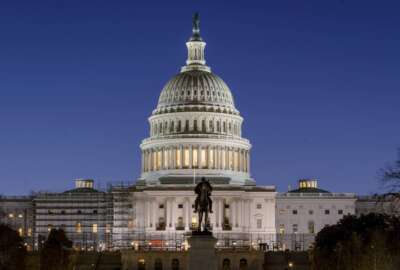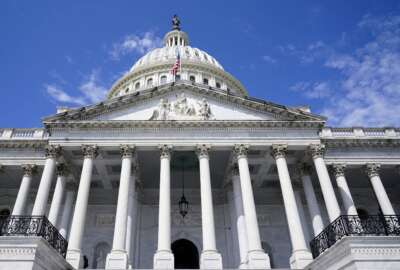A view from Capitol Hill with Bloomberg’s Loren Duggan
Just yesterday afternoon, the Senate gave final passage to the Inflation Reduction Act after a full weekend of votes on amendments.
Best listening experience is on Chrome, Firefox or Safari. Subscribe to Federal Drive’s daily audio interviews on Apple Podcasts or PodcastOne.
By modern standards anyway, it’s been a frenzy of legislative activity on Capitol Hill. Besides the annual appropriation and authorization process going on right now. First, we had the far reaching CHIPS Act. Then just yesterday afternoon, the Senate gave final passage to the Inflation Reduction Act after a full weekend of votes on amendments. Loren Duggan is deputy news director at Bloomberg Government and he joined Jared Serbu on the Federal Drive with Tom Temin to break down the latest.
Interview transcript:
Jared Serbu: And Loren, it’s kind of an unusual feeling to be able to have a chance to talk with you about actual legislative enactments that the downside is, there’s so much here, we’ll never get to it in the eight or nine minutes we usually have with you. Let’s start with the Inflation Reduction Act, though. Obviously, we don’t even have a final bill down on paper, as amended probably yet. So people are going to be going through this for quite some time to figure out what all the implications for federal agencies actually are. But what strikes you right off the top?
Loren Duggan: Well, this is a big win for Democrats. You have a 50/50 Senate where you had to keep everyone on side to pass this bill. And they had to get everyone on side in the first place to even take it up on Saturday, and then wrap it up yesterday on Sunday and get it over to the House for final action. But in terms of what agencies can expect and once this bill was signed into law, there is a lot of money that’s going to flow to a lot of agencies. The biggest pool of money that some people have looked at is this $80 billion or so for the IRS to increase enforcement, increase hiring. The Democrats have said that this will ensure that the tax gap is closed, and that more money is collected, because you’ll have more people available to do that. So that’s obviously one agency that’s expecting a lot of money out of this. But if you look across the Energy Department and the EPA and other agencies that play a role in the climate change agenda that Democrats have wanted to push for and that President Biden is on board with, there’ll be a lot of money, there. Transportation Department gets money, HUD gets money. So there are a lot of agencies that will get a burst of cash as a result of this bill.
Jared Serbu: And just to stick with the IRS piece for a bit, that $80 billion, I think the CBO [Congressional Budget Office] estimate on that, was that actually raises more than $200 through that – a $200 billion rather, through that additional enforcement over the next two years, which is I think one of the ways this eventually became something more like a deficit reduction bill compared to the more than $4 trillion that they were originally thinking about with Build Back Better. Fair to say those revenue raisers are a big part of what got this across the finish line?
Loren Duggan: Absolutely. Joe Manchin, who was key to getting this deal had said for most of this year that he couldn’t get on board with a bill like this unless there was a deficit reduction component. So the package that he and Chuck Schumer had put together about a week and a half ago had that $300 billion revenue raising aspect to it that would have, that wasn’t applied to any of the spending or tax expenditures, if you will, that are in this package. One of the key arguments has been, as you said, that giving more money to the IRS will yield more money as the IRS collects more money, something like $200 billion over the next 10 years. There was an asterisk by that because it’s not a direct raising of money. But if you look at the CBO score, or you look at the way it’s talked about, it is there at least a memorandum saying that this money is anticipated even if it didn’t count directly toward the normal score for this bill. So when you were looking at the official estimate, it was more like $100 billion in savings. We’ll have to see what it looks like with some of the last minute changes, including on the floor yesterday. But this bill will have at least a deficit reduction aspect. There’s some dispute over whether there will be an actual reduction in inflation. That’s certainly an argument that I think will be, we’ll see play out in the coming months about what the end result of all this will be. But there is that deficit reduction aspect that you mentioned.
Jared Serbu: And we probably don’t want to talk about this bill, Loren, as though it’s a complete done deal quite yet, because it’s still got to get through the House. Is there anything you see in here that could be problematic for the Democratic caucus on that side that would prevent them from getting it through this week?
Loren Duggan: Well it got an important thumbs up yesterday from Pramila Jayapal, who is the head of the Congressional Progressive Caucus, and we’ve seen a lot play out over the last two years where the progressives have felt they’ve had to kind of swallow bills that they didn’t want. When it came to last year’s infrastructure law, they really wanted to pause that while they worked on their version of this budget reconciliation bill, which as you mentioned, was much broader, much more expensive, touched a lot more programs. But everyone in the Democratic caucus seems to have come behind this bill, or most of them at least, to try to get this done because of what it does on prescription drug negotiations, because of what it does on taxes, because of what it does on climate change spending, $370-plus – probably at this point – billion for climate change initiatives and environmental programs. So there’s a lot in this bill that people like. The president’s on board with it. I think people want to take the win and go home and go on to the election trail with it.
Jared Serbu: Now does this bill in the sort of Schoolhouse Rock sense is tangentially related to the 2023 appropriations bill since we’re supposed to be reconciling the budget for ’23 here but really it’s long term legislative changes and tax changes here, right? Do correct me if I’m wrong, I don’t think this really affects ’23 appropriations in any way. So where does that leave us for actually getting enactments of appropriations for next year?
Loren Duggan: You’re correct that procedurally they’re different. This was a reconciliation bill actually enter the fiscal ’22 budget resolution. So going back even to last year and the process that played out there. We’re turning towards fiscal ’23. That’s going to be a focus when everyone gets back into town in September. There could be some political spillover here, some Republicans were saying that well, this reconciliation bill poisoned the well a little bit. And we’ll have to see. There’s also this side deal that was reached between Joe Manchin and Charles Schumer to maybe do some things in the continuing resolution that we expect in September to fund the government that might be riding on there. And we’ll have to see how that plays out once they get back. But the two are largely separate and on separate tracks. One is much closer to the finish line and the terms of this reconciliation bill than the other where appropriations are very much up in the air.
Jared Serbu: And let’s close out Loren by talking a bit about the CHIPS Act. Speaking of big legislative enactments, I guess I shouldn’t call it just the CHIPS Act, because it’s not just that. The semiconductors pieces of the legislation, which had been the CHIPS Act got tacked on to a bunch of other science provisions that have gotten less attention. Just give us a bit on what some of the big things that that’s going to do with regard to federal agencies in the science sections.
Loren Duggan: Sure. This is another one these bills that was really big at one point and got a little bit smaller and then got bigger again before it was finished by Congress. So the Chips and Science Act, as it’s called, at the heart of it is $50-plus billion for semiconductor production in the U.S. Most of that under the Commerce Department’s auspices, but then there’s also an authorization boost for many of the science agencies. So the National Science Foundation, National Institute of Standards and Technology, Energy Department, they’ll have more money in the future potentially through authorizations in this bill, although Congress will have to come back and give that to them over the next several years. The chips part is mandatory spending that will go out the door. But Democrats have also touted this as a pretty big win. There was more bipartisanship behind that bill, both in the Senate, less so in the House because between Senate passage and House passage, we had the announcement of that deal when some Republicans pulled back their support. But this is going to be a big win again, for the Democrats. I think we’ll see a signing ceremony this week at the White House now that President Biden is COVID-negative again. Hopefully he can have the kind of event he wants to to celebrate that piece of legislation. But between that the reconciliation bill, getting the Senate to sign off on Finland and Sweden joining NATO, a really big week for him and the Democrats. And at least some bipartisanship when you look at things like the CHIPS bill, which I’m sure there will be Republicans on hand for that as well.
Jared Serbu: Loren Duggan joining us from Bloomberg Government. Loren, thanks as always for joining us. Appreciate it.
Loren Duggan: Thank you.
Copyright © 2024 Federal News Network. All rights reserved. This website is not intended for users located within the European Economic Area.
Tom Temin is host of the Federal Drive and has been providing insight on federal technology and management issues for more than 30 years.
Follow @tteminWFED






